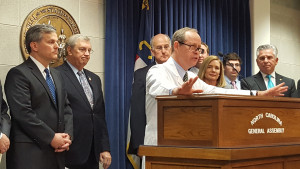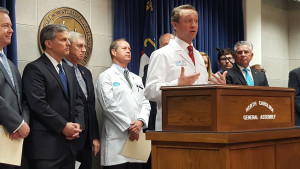North Carolina Senators, Representatives, law enforcement officials, physicians and the NC Attorney General among others gathered at a press conference this morning to introduce the STOP (Strengthen Opioid Misuse Prevention) Act, legislation aimed at curbing the state’s opioid abuse epidemic.
 Rep. Greg Murphy, MD, (R-Pitt), a sponsor of the bill, noted his unique position as a legislator and a physician. He wore his white coat to the press conference to show that prescribers take ownership and leadership on this issue. The bill contains a mandate for physicians to register and to use the Controlled Substance Reporting System (CSRS) as well as some limits on prescriptions for acute pain. Dr. Murphy admitted that as a physician he is sometimes irritated by the hassle of checking the CSRS and the additional paperwork.
Rep. Greg Murphy, MD, (R-Pitt), a sponsor of the bill, noted his unique position as a legislator and a physician. He wore his white coat to the press conference to show that prescribers take ownership and leadership on this issue. The bill contains a mandate for physicians to register and to use the Controlled Substance Reporting System (CSRS) as well as some limits on prescriptions for acute pain. Dr. Murphy admitted that as a physician he is sometimes irritated by the hassle of checking the CSRS and the additional paperwork.
“Our goal is to save lives,” he told the press. “We all must make sacrifices.”
 Christopher Grubb, MD, an anesthesiologist who has provided opioid prescribing CME at North Carolina Medical Society (NCMS) events including an upcoming course on March 18 in Greenville, also spoke at the press conference. He lauded the NCMS for their role in educating physicians calling opioid abuse and addiction a complicated issue. He said he hoped the proposed legislation also would serve to educate the public on the many facets of the problem.
Christopher Grubb, MD, an anesthesiologist who has provided opioid prescribing CME at North Carolina Medical Society (NCMS) events including an upcoming course on March 18 in Greenville, also spoke at the press conference. He lauded the NCMS for their role in educating physicians calling opioid abuse and addiction a complicated issue. He said he hoped the proposed legislation also would serve to educate the public on the many facets of the problem.
 NC Attorney General Josh Stein also mentioned the NCMS as a partner in helping to curb the opioid epidemic in which four North Carolinians die every day from a medication or drug overdose.
NC Attorney General Josh Stein also mentioned the NCMS as a partner in helping to curb the opioid epidemic in which four North Carolinians die every day from a medication or drug overdose.
Stein and the sponsors of the bill including Sen. Jim Davis (R-Cherokee), Rep. Craig Horn (R-Union), and Rep. Ted Davis (R-New Hanover) spoke of the comprehensive nature of the bill, which also provides $10 million in funding for this 2017-18 budget cycle and again in 2018-19 for community-based treatment and recovery services for substance use disorders. Sen. Tom McInnis (R-Stanly) shared how this epidemic had touched him personally with the death of his son.
“This bill is a work in progress,” said Sen. McInnis. “We want to make sure our citizens are protected.”
The bill is to be officially introduced this morning. Watch the 2017 Legislative Session blog for a more detailed summary of the bill. In the meantime, this brief overview was provided by the NC Attorney General’s office.

This is unfortunately yet another example of government interfering with the practice of medicine. This proposed solution penalizes physicians who are not part of the problem. The issue of heroin overdoses has nothing to do with physician prescribing practices. Assigning a fee to prescribers and requiring electronic prescribing for all controlled substances is massive overkill and an unnecessary burden on practicing physicians. Many of the drugs on the DEA schedules are not part of the most frequent problems encountered by law enforcement, and are not typically major issues with addiction. How does placing restrictions on the occasional prescribing of Lomotil and Ultram endanger safety to the extent that big government must intervene? Requiring electronic prescribing exposes physicians to potential massive costs associated with governmental penalties and lawsuits because of hacking, breaches of data security and HIPAA issues.
If it is mandatory we are going to have more regulation, it ought to be tailored to the problem prescribers and to the drugs that are most problematic.